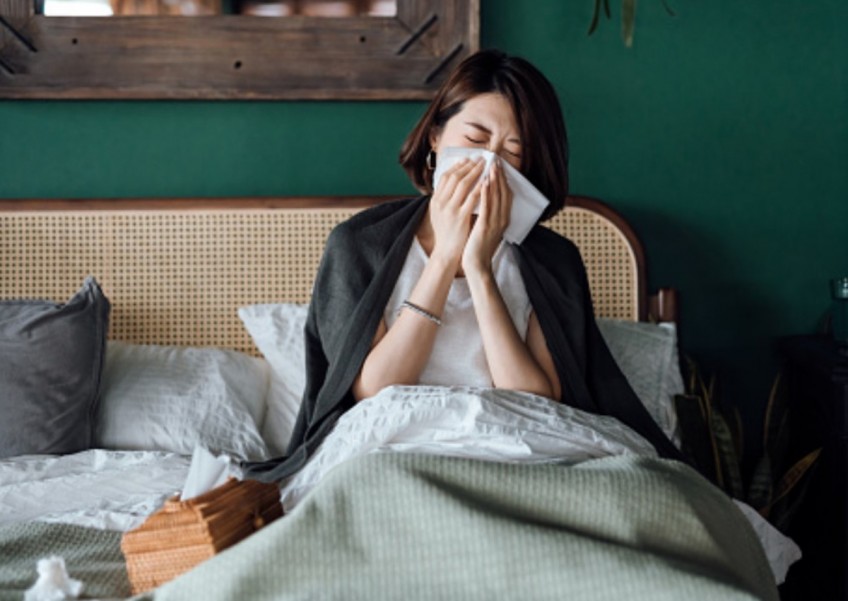Tips and tricks to manage symptoms of period flu

If there's a certain time of the month when women are more vulnerable and not at their best, it's probably when they have their period.
And if the uncomfortable feeling and constantly checking if there are red stains on our pants is not enough to put us in a sombre mood, you can add the flu-like symptoms we get almost every time. That's called period flu.
Many women experience period flu, which can cause flu-like symptoms such as fatigue, headaches, body aches and mood swings. Although it can be uncomfortable, there are ways to manage and alleviate its symptoms.
This article will explore the causes of period flu, when it starts and how long it typically lasts. We will also provide tips and remedies for treating and preventing it, along with lifestyle changes that can help manage your symptoms.
Whether you're new to experiencing period flu or searching for new ways to manage it, we've covered you with 10 friendly tips to help you feel your best during your menstrual cycle.
Period flu, also known as menstrual flu, is a condition some women experience before or during their menstrual period. The symptoms of period flu are similar to those of the regular flu, such as fatigue, headaches, body aches, nausea and mood swings.
However, this flu is specific to the menstrual cycle and can significantly impact a woman's daily life.
The symptoms of period flu can vary in severity and duration. Some women may experience mild symptoms, while others may have more severe ones that last several days.
Common symptoms of menstrual flu include fatigue, headaches, body aches, nausea, bloating and mood swings.
Additionally, some women may experience changes in their appetite, sleep patterns or bowel movements.
While the symptoms of period flu and regular flu may be similar, there are some key differences. For example, period flu is specific to the menstrual cycle and occurs during or before menstruation. In contrast, regular flu can occur at any time of the year and is unrelated to the menstrual cycle.
Additionally, period flu does not typically cause fever or respiratory symptoms, which are common in regular flu.
It's important to note that if you are experiencing flu-like symptoms outside of your menstrual cycle, it may be a sign of another health issue, and you should consult your healthcare provider.

The exact cause of period flu is unknown, but several factors are believed to contribute to its development. Here are some of the most common causes of period flu:
Hormonal fluctuations during the menstrual cycle can cause symptoms, including period flu. The levels of estrogen and progesterone in the body fluctuate during the menstrual cycle, which can impact mood, energy levels and inflammation.
Inflammation is a natural response to injury or infection in the body. However, chronic inflammation can contribute to a variety of health issues, including period flu. Inflammation during the menstrual cycle can cause fatigue, headaches and body aches.
Some women may be more prone to developing menstrual flu due to genetic factors. If your mother or other female relatives experience period flu, you may be more likely to experience it as well.
Stress can impact the menstrual cycle and contribute to the development of period flu. When the body is under stress, it produces more cortisol, impacting mood and energy levels.
Other factors that contribute to the development of period flu include poor sleep, unhealthy diet, lack of exercise and pre-existing medical conditions.
While the causes of period flu are complex and involve many factors, understanding the potential factors contributing to its development can help women manage their symptoms and improve their overall well-being.
ALSO READ: 8 things you might not know about the flu
The duration of period flu can vary from person to person, and it may last for a few days up to a week.
However, it's essential to note that these symptoms could also be a sign of an underlying medical condition, and if they persist or worsen, you should consult your healthcare provider.
Here are some tips that could help shorten the duration of period flu symptoms:
Stay hydrated: Drinking plenty of water and other fluids can help prevent dehydration and reduce the symptoms' severity.
Get some rest: Rest is crucial for your body to recover. Taking time off work, reducing your activities and getting enough sleep may help.
Over-the-counter medications: Medications like painkillers, anti-inflammatories and anti-diarrheal drugs may help alleviate symptoms.
Heat therapy: Applying heat to the affected area may help relieve menstrual cramps and body aches. You can use a heating pad, a hot water bottle or take a warm bath.
Herbal remedies: Some people find relief from menstrual symptoms by using herbal remedies such as ginger, turmeric or chamomile tea.
Maintain good menstrual hygiene: Change your pads or tampons regularly to prevent infection.
If your symptoms persist or worsen, consult your healthcare provider. They can help identify the underlying cause and recommend the appropriate treatment.
There is no fixed timeline for when period flu symptoms may start, as they can vary from person to person. However, in general, the symptoms may begin a few days before or during the menstrual cycle and may last for several days.
Here are some common patterns of onset for period flu symptoms:
Some people may experience period flu symptoms in the days leading up to their menstrual cycle. These symptoms may include fatigue, headaches and body aches.
The onset of period flu symptoms may coincide with the start of menstruation. Symptoms during this time may include cramps, nausea and diarrhoea.
Some people may experience period flu symptoms after their menstrual cycle has ended. These symptoms may include fatigue and body aches.
It's important to note that not everyone experiences period flu symptoms, and the severity and duration of the symptoms can vary from person to person. If you experience severe or persistent symptoms, it's essential to consult your healthcare provider.
Period flu symptoms can be uncomfortable and disruptive to your daily routine, but several treatments can help alleviate them. Here are some ways to treat period flu:
Apply a warm compress to the affected area to alleviate cramps and body aches.
Drink plenty of water and herbal tea to stay hydrated and reduce bloating.
Use aromatherapy with essential oils like lavender or peppermint to ease headaches and calm nerves.
Exercise regularly to improve mood, reduce stress and alleviate symptoms.
Get enough sleep to help the body heal and restore energy.
Non-steroidal anti-inflammatory drugs (NSAIDs) like ibuprofen or naproxen can help reduce pain, fever and inflammation.
Antacids or anti-diarrheal drugs can help alleviate gastrointestinal symptoms such as nausea, vomiting and diarrhoea.
Hormonal birth control pills can help regulate menstrual cycles and reduce symptoms.
Eat a balanced diet rich in nutrients and fibre to support overall health and regulate hormones.
Avoid caffeine and alcohol, which can exacerbate symptoms.
Practise stress-reducing techniques such as yoga, meditation or deep breathing exercises.
Quit smoking, which can worsen symptoms and increase the risk of menstrual disorders.
If your symptoms persist or worsen, consult your healthcare provider. They can help identify the underlying cause of your symptoms and recommend the appropriate treatment.
Managing period flu symptoms can be challenging, but it's possible with the right strategies and support.
By taking care of your body through rest, hydration and self-care, you can reduce the severity and duration of symptoms and improve your overall well-being.
Remember to listen to your body, seek medical attention if needed and practise self-compassion.
ALSO READ: Is your family protected against flu?
This article was first published in theAsianparent.